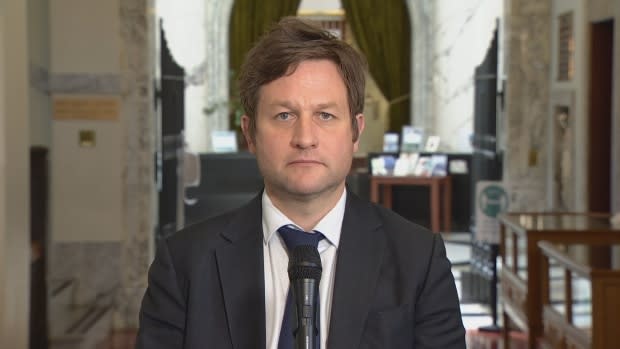Concern that cohort system in B.C. schools will neglect special needs students, substitute teachers
On-call teachers and advocates for children with disabilities are concerned the B.C. government's plan to divide students into "learning groups" in the new school year may disadvantage substitute staff and special needs students.
The group measures are being brought in to limit the potential spread of COVID-19 while allowing for more social interaction when students return to classes full time in September.
According to the provincial plan, elementary and middle school learning groups will have a maximum cohort of 60 students, while those in secondary school will have up to 120.
Tracy Humphreys, founder and chair of the volunteer-run BCEdAccess Society, said the cohort system may reinforce the exclusion of disabled students from full-time, in-school learning — something that appears to be increasing, according to the society's surveys of parents over the past two years.
"[Disabled] students may not be able to implement proper mask-wearing … They [B.C. Ministry of Education] are talking about [disabled students] needing to be separated because they might have health concerns. And those health concerns might not be enough to get staff using proper protective equipment," she told Stephen Quinn, host of CBC's The Early Edition.

The province said parents and students will be hearing more from school districts by Aug. 26 about learning groups, among other information.
But Humphreys said school districts don't provide specific communication regarding support for special needs students, and she's concerned about the challenge the society faces of dealing with 60 school districts across B.C.
"In terms of advocacy, that's really challenging when you're seeking accountability [and] when those [back-to-school] plans are not followed through. And that's what we saw in the beginning during the pandemic, and that's actually what families of children with disabilities see all the time."
Humphreys says the Ministry of Education is well aware of her society's concerns.
"We've been working quite closely with the inclusive education division [of the ministry] throughout the pandemic since it started to try to discuss ways to ensure that their policies help direct the districts to better support children with disabilities."
Concern over shortfall in work for substitute teachers
Meanwhile, substitute teachers are concerned that work will dry up under the cohort system.
Christine McKinnon and Karine Ng are teachers on call in Vancouver. Both said they hadn't received concrete information about what the learning groups will look like.

McKinnon worries she may not get called under the new system, because substitute teachers often have to work in multiple schools.
"I'm not sure how closely [teachers] are meant to fit into these learning groups or cohorts, which are already huge," she said on The Early Edition.
Ng said teachers teaching on call (TTOCs) often feel compelled to sign up for work in as many quadrants of the Vancouver school district as possible in order to maximize their work.
"We can choose up to three quadrants to work in … But for a lot of TTOCs that's not a real choice they can make, because there's the worry that they may not get enough work limiting themselves to one, two or three quadrants," Ng said.
McKinnon says work should be made available for substitute tutors during the pandemic when full-time teachers have to take sick leave for even minor symptoms.
She said it would be "extremely valuable" if TTOCs could be assigned to certain schools on a more permanent basis.


